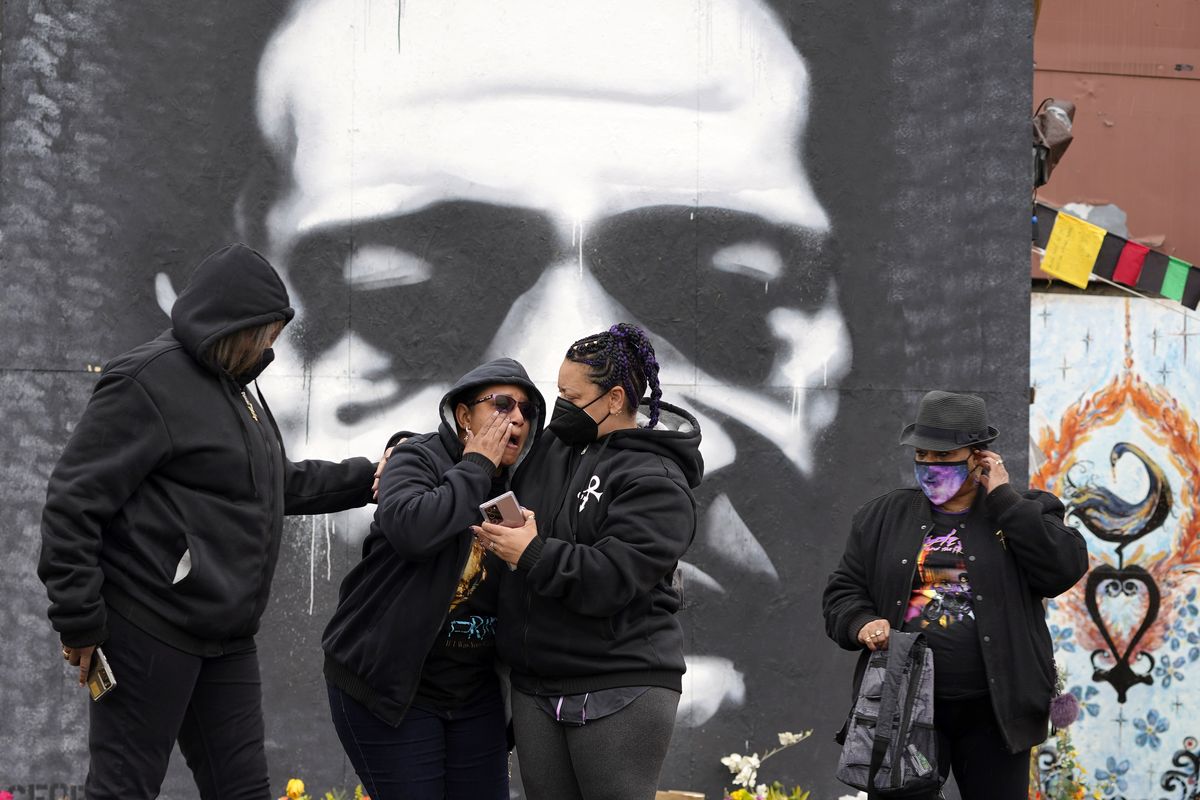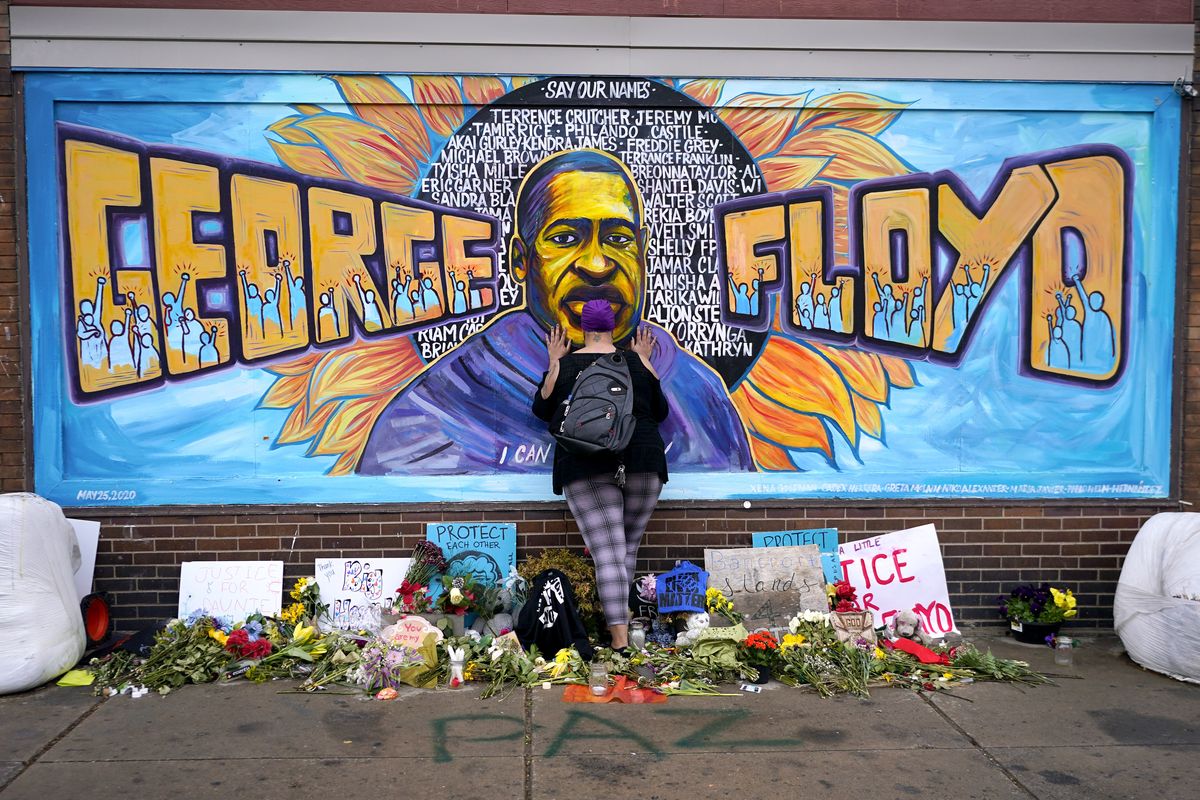Dad Daze: Where do we go after the George Floyd verdict?
A group of women from Colorado and North Carolina react while paying respects to George Floyd at a mural at George Floyd Square on Friday in Minneapolis. (Julio Cortez/Associated Press)
When my sons Eddie and Milo and I were visiting Minneapolis just weeks after George Floyd was murdered by police last spring, it was impossible not to talk about the elephant in the land of lakes. No, we didn’t trek to the spot where Floyd’s life was taken. Experiencing the disturbing video of his death had such an impact on each of us that we had no desire to make such a trip.
Instead, we talked about how such an act could be committed. It wasn’t easy initially to discuss the abuse of power with my sons since they couldn’t relate. Even though both of my boys have traveled extensively, it’s about where you live. To put it in perspective, I was at a neighbor’s Halloween party three years ago, just hanging out, but there was a knock at the door. The police asked for my son.
Eddie’s friend was running from the police and asked if he could hide in our house. The police found Eddie’s pal in his closet. The child apparently was caught shoplifting and had an ugly fight with his parents and fled. Eddie had never heard of aiding and abetting. But how would he know about it since his existence has been a relatively sheltered suburban life?
A year later while visiting my daughter Jillian at her college in New York City, I received a call from Eddie. A fight broke out, the police arrived, and they extinguished the brawl. The combatants received a slap on the wrist, and Eddie was basically put to bed by the police. Eddie was fortunate. If he lived elsewhere and didn’t look like a Swedish expatriate, his fate might have been different.
We had a long talk after the incident. Always be courteous when stopped by the police. Since you’re dealing with humans, you don’t know what will happen. Who knows who is having a bad day, going through a divorce or a lousy night’s sleep? A few years ago, in sleepy Brigantine, New Jersey, which is shouting distance from Atlantic City, I was stopped by a policeman in the dead of winter in a town that’s basically shuttered from October to April.
I asked the clearly agitated officer to detail the transgression. “I could say you were doing anything,” he said with a maniacal grin. “I could say you were speeding, or you went through a stop sign, or you were swerving.” My mind raced so fast, the cop could have given me a ticket for rapid thought. “Man, what is this guy, who’s obviously on edge, going to do?” I wondered.
You hear or read about such power trips, but it’s something altogether different when you are stopped by an unhinged person with authority. I don’t even remember what I was rung up for, but I perfectly recall the menacing look and disturbing reaction from a bored, young cop. But what I experienced is nothing compared to what some of my friends of color have described.
My friend Eric, who is Black, has said over and over again that Bruce Springsteen nailed it with his emotional gem “American Skin (41 Shots),” which was inspired by the police shooting of immigrant Amadou Diallo. “Is it a gun / Is it a knife / Is it a wallet / This is your life / It ain’t no secret, my friend / You can get killed just for living in your American Skin.”
This is not an anti-police column. I’ve had many good experiences with the police. There was the time my very pregnant wife was days away from delivering Milo, and she demanded that I make an illegal U-turn in the driveway of a fire department. A police officer immediately hit the lights. “Officer, I was forced to make the U-turn because of this,” I said as I pointed to a hysterical woman with child.
“I understand more than you know,” the officer said with a glimmer of sympathy. “Have a great day, and good luck with the baby.” When my wife was days away from having our first child, a flat tire delayed our trip to a Broadway play. A state trooper on the New Jersey Turnpike pulled behind us and insisted on helping. And then there was the lieutenant who backed me up when I was a security guard at Philadelphia Eagles games at Veterans Stadium a generation ago.
I’ll never forget the time I was running late for the Governor’s Ball, a music festival at New York’s Randall’s Island with Jillian. There was a parking spot that looked a little small at 125th and Lexington. I tried to squeeze in my car by using both bumpers. “You’re banging my car awfully hard,” a NYPD policewoman said after I kept hitting her van. “Can you move back just a little bit?” I asked. “We’re running late for Lorde, and you can park anywhere.”
“I just have to get my keys in the station,” the officer said. A sincere thanks to those in blue. Being a cop is a thankless job akin to hosting the Oscars or being an umpire. You’re not noticed until something goes wrong. The problem is that so much has gone wrong over many, many years. No one can bring Floyd back, but a wrong has been corrected. The question my children have asked is where do we go from here.
The conviction of the Minneapolis officer, Derek Chauvin, who placed his knee on Floyd’s neck for nearly nine minutes until he could no longer breathe, is a step in the right direction. Egregious use of police power can no longer be tolerated. However, change starts at home with parents and children. Right and wrong, biases and stereotypes are embedded at an early age.
Since the impact of religion and the church is diminishing in our increasingly secular world, it’s up to mothers and fathers to set the tone. When I was growing up, my parents embraced everyone and spoke of how important it was not to have preconceived notions about anyone. “First impressions can be deceiving,” my father explained. “Get to know a person.”
While working in construction, my dad worked with folks from myriad backgrounds. They would share rides, and his pals would hang out during barbecues. When my parents’ all-white neighborhood changed, they stayed. “Why should we move?” my mother asked. “We have everything here, and we’ll meet new people. We’ll be fine.”
My parents were more open-minded than some of those teaching at my Catholic elementary school. When news broke that Pope John Paul II would become the first non-Italian pope since the 16th century, the Polish jokes commenced. “What’s he going to do, wear a square beanie?” a nun standing in front of me cracked. Being half-Polish, I was incredulous and insulted.
Martin Luther King Jr. said it best. “Injustice anywhere is a threat to justice everywhere.” For there to be justice, there needs to be equality. A friend believes that there will never be true equality due to tribalism. That might be so, but can we at least try? Can we not only give peace a chance, but can we give each other a chance?
A difference can be made at home, and it starts at a very early age. I’m encouraged when I speak and meet with my children’s friends who don’t seem to suffer from prejudice. An encouraging sign was Milo’s former baseball teammates’ reaction to racism. While watching Milo play a game in Hayden last summer, I received a call about his former baseball academy.
The father of Milo’s friend told me that before a game the prior week, a coach pulled aside his team and pointed to two Black opposing players and said, “We’re going to George Floyd them.” Coaches and players left the organization immediately. So, there is hope. Much of our future depends on doing the right thing and parents raising their youngsters in a proper, open-minded fashion.
It’s time to join together and embrace our differences – if not for ourselves, for our children and future generations.

